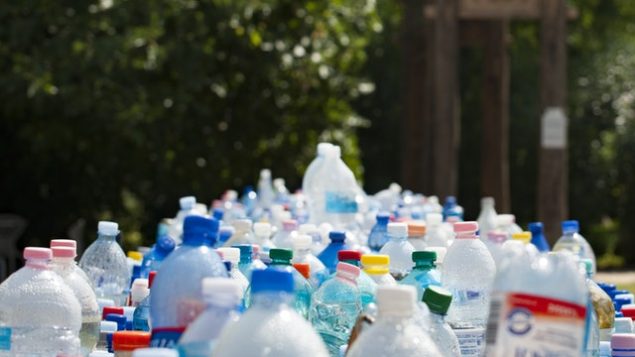Canada “among the most wasteful”
“Canada is among one of the most wasteful countries in the world,” says Ashley Wallis of Environmental Defence, and although we recycle, the changing nature of waste is making that difficult.

Ashley Wallis says there is no one-size-fits-all solution to recycling in Canada. (Environmental Defence)
Total waste disposal amounted to more than 25 million tonnes in 2014. Many Canadians can place recyclable materials at the curb and have it picked up by their municipalities. But recycling programs were designed 30 years ago at a time when there was a lot of newspaper, glass and cans filling those recycling bins.
Some plastics can compromise recycling process
These items had value and municipalities could make money selling them to offset the cost of picking them up. But there is now less of that material and much more plastic which presents two problems, according to Wallis.
“Not all plastics are recyclable. And then…there’s a lot of new plastics which are being introduced on a fairly regular basis which are complicated and, as a consumer or resident, you might not be able to identify whether this new plastic should be going in your recycling bin or…in your garbage bin.
“And if you put it in your recycling bin and it’s not actually recyclable it becomes a contaminant and it can actually compromise the entire recycling process.”

There used to be more newsprint in recycling boxes and other materials which could be sold to offset the cost of collection.
Businesses made responsible in B.C.
There is no one-size-fits-all solution in Canada. Waste is managed by provincial and municipal authorities and rules may differ across the country. Consumers could contact their municipality to try to sort out which plastics are recyclable but that could be complicated and more effort than most people would make.
Another solution is to make businesses responsible for recycling the packaging of their products. This is the rule in the western province of British Columbia. There are several jurisdictions where manufacturers share the cost of recycling.
Firm targets needed, says environmentalist
Wallis says it would be helpful for other provinces to make businesses shoulder the cost of recycling their packaging and, at the same time, the federal government should set one target for the whole country as to what percentage of waste should be recycled.
It appears the Canadian government will raise the issue of plastic waste in marine environments at the G7 meeting it will host in June 2018. Wallis hopes that will result in a firm target or goal for the recovery of plastic waste and not simply an aspirational statement.
Meanwhile, choose wisely
In the meantime, she adds, consumers can help by not using bottled water, straws or one-time use plastic bags, and by preferring products packaged in glass, cardboard, cans or other materials that are more easily recycled.







For reasons beyond our control, and for an undetermined period of time, our comment section is now closed. However, our social networks remain open to your contributions.